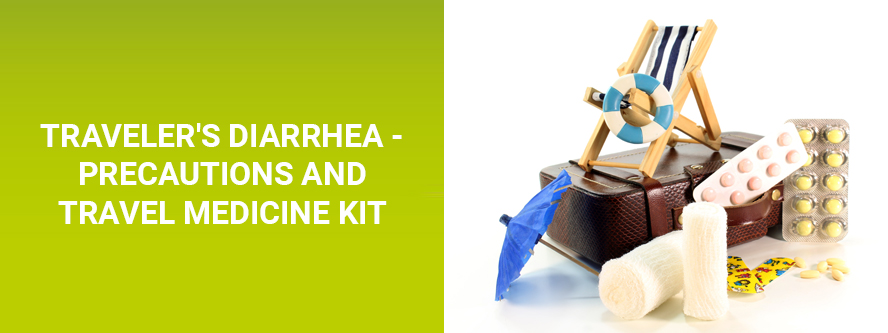It’s finally here, the long-awaited vacations in foreign countries. Traveler’s diarrhea may stem from the stress of traveling or a change in diet. But usually infectious agents — such as bacteria, viruses or parasites — are to blame.
Due to poor hygiene measures, you can quickly upset your stomach and diarrhea can become an unpleasant vacation companion. We have compiled valuable tips for you on how to prevent traveler’s diarrhea and what you should have in your travel medicine bag.
We have compiled valuable tips for you on how to prevent traveler’s diarrhea and what you should have in your travel medicine bag.
Prevention
Observe the regulations on food hygiene. The general rule of thumb when traveling to another country is this: “Boil it, cook it, peel it or forget it.”
If you follow this, you have a good chance of avoiding diarrhea. In areas with low sanitary standards, you should follow certain precautions:
- Wash your hands before every meal.
- Do not wash fruit and vegetables with tap water, but peel them instead.
- Boil or otherwise disinfect drinking water.
- Do not consume raw animal foods such as meat, seafood and eggs.
- In case that diarrhea pathogens such as typhus or cholera often occur in the travel area get vaccinated before you travel.
- Tap water in areas with poor hygiene standards is often neither suitable for drinking nor for brushing your teeth. Therefore, use mineral water or boiled water for brushing your teeth in such countries.
- You should also avoid ice cubes. Please note that fresh fruits are often served on ice cubes to keep them cool.
Travel Medicine
You know your personal health problems best and know which medications you can tolerate if you have symptoms. Make sure you put together your individual travel pharmacy for your foreign vacation. If you are not sure of which products to choose, you should consult your family doctor for advice. A pharmacy would also be happy to advise you.
If you have previous illnesses, it makes sense to take the required medication in your travel pharmacy kit in sufficient quantities, since not all pharmaceutical preparations are always available in the same quality abroad.
Have your family doctor certify the necessity of these medications. This will help you avoid problems when going through customs clearance.
Besides sufficient medication for your personal health problems, we recommend that your travel pharmacy should contain products against:
- Stomach discomfort, constipation, diarrhea
- Cough, runny nose, hoarseness, sore throat
- Insect bites
- Sprains/bruise, muscle tension/sciatica/rheumatism
- Fungal diseases of the skin, skin injuries/soreness
- Skin disorders/itching
- Sunburn, sunstroke, heat stroke
- Venous diseases
- Allergies
- Headache, toothache, earache
- Motion sickness, restlessness/nervousness, sleep disturbances
- Conjunctivitis
- Contraceptives
- Fever thermometer
Special products for diarrhea
You can add a few products to your travel pharmacy that are especially helpful in diarrheal diseases:
- Electrolyte powder: mix in water and drink
- Emergency diarrhea medication, e.g. to stop dangerous water loss or to survive a long bus ride
- When traveling to regions with insufficient medical care, your doctor can prescribe antibiotics
- Antihistamines against allergic reactions
- Preparations to build up the intestinal flora
- If you are lactose intolerant: lactase tablets
- If there is a histamine intolerance: DAO tablets
Only use medications that stop the diarrhea completely in case of emergency. Diarrhea cleanses the body. If diarrhea is stopped, the intestines can no longer eliminate pathogens and toxins.
Important: If there is no improvement after two to three days or the diarrhea are very strong, you should definitely consult a doctor.
Note: If you suffer from frequent diarrhea, this could be caused by food intolerances and allergies, e.g. lactose, fructose or histamine intolerance. Here we recommend that you get in contact with your health care practitioner (HCP) for further consultation. If these intolerances are not responsible for your diarrhea, the cause may be an IgG food hypersensitivity. IgG food hypersensitivities often remain undetected because the symptoms only occur a few hours or even days after the consumption of a trigger food. This makes them extremely difficult to identify. Fortunately, a reliable diagnostic test and nutritional concept can help: ImuPro. Find out more about the ImuPro test without obligation.

